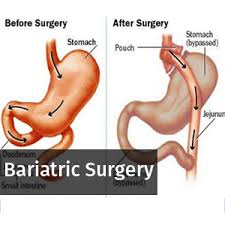- Home
- Editorial
- News
- Practice Guidelines
- Anesthesiology Guidelines
- Cancer Guidelines
- Cardiac Sciences Guidelines
- Critical Care Guidelines
- Dentistry Guidelines
- Dermatology Guidelines
- Diabetes and Endo Guidelines
- Diagnostics Guidelines
- ENT Guidelines
- Featured Practice Guidelines
- Gastroenterology Guidelines
- Geriatrics Guidelines
- Medicine Guidelines
- Nephrology Guidelines
- Neurosciences Guidelines
- Obs and Gynae Guidelines
- Ophthalmology Guidelines
- Orthopaedics Guidelines
- Paediatrics Guidelines
- Psychiatry Guidelines
- Pulmonology Guidelines
- Radiology Guidelines
- Surgery Guidelines
- Urology Guidelines
Reduction in pain and disability in most cases post Bariatric Surgery

In the three years following bariatric surgery, the majority of patients experienced an improvement in pain and walking ability, as well as a lessening of the degree to which back or leg pain interfered with work, according a University of Pittsburgh Graduate School of Public Health-led analysis of a multi-site clinical study published in the Journal of the American Medical Association.
The study also revealed patient characteristics that indicate who is the most and least likely to experience improvements in pain and function, a finding that could allow clinicians to identify patients who may require additional interventions to improve outcomes. The research was funded by the National Institutes of Health (NIH).
"Our study found that clinically meaningful improvements in bodily pain, specific joint pain and physical function are common following bariatric surgery. In particular, walking is easier, which impacts patients' ability to adopt a more physically active lifestyle. However, some patients continue to have significant pain and disability," said lead author Wendy King, Ph.D., associate professor in the Department of Epidemiology at Pitt Public Health. "This data can help patients and clinicians develop realistic expectations regarding the impact of bariatric surgery on pain and disability."
Dr. King and her colleagues followed 2,221 patients participating in the Longitudinal Assessment of Bariatric Surgery-2 , a prospective study of patients undergoing weight-loss surgery at one of 10 hospitals across the U.S. After three years, patients weighed, on average, 28 percent less than prior to surgery. The majority of the patients received Roux-en-Y gastric bypass, a surgical procedure that significantly reduces the size of the stomach and changes connections with the small intestine.
Through three years of follow-up, 50 to 70 percent of adults with severe obesity who underwent bariatric surgery reported clinically important improvements in bodily pain, physical function and usual walking speed. About three-quarters of the participants with symptoms indicative of osteoarthritis before surgery experienced improvements in knee and hip pain and function. In addition, over half of participants who had a mobility deficit prior to surgery did not post-surgery.
Older age, lower income, more depressive symptoms and pre-existing medical conditions, including cardiovascular disease and diabetes before surgery, were among the factors independently associated with a lower likelihood of improvement in pain and mobility post-surgery, while greater weight loss, greater reduction in depressive symptoms, and remission or improvement in several medical conditions were associated with greater likelihood of improvement.
In the first year following bariatric surgery, 3.7 percent of patients had hip, knee or ankle surgery; in the second year, 4.9 percent had such surgeries followed by another 4.6 percent in the third year. The majority were knee surgeries. The incidence of back surgeries ranged from 1.5 percent in the first year to 2.3 percent in the third year.
Three years post-surgery, 76.3 percent of patients reported that their leg and back pain interfered with their work "not at all," up from 54.1 percent pre-surgery. Also, the average physical function score of the participants, which is based on ability to walk various distances, climb stairs, perform vigorous and moderate activities, lift and carry groceries, bathe, dress, bend and kneel, improved to the point that it was comparable to that of the general U.S. population. Resting heart rate also improved.
"Functional status is an extremely important aspect of health that has not been as well-studied as other conditions that change following bariatric surgery, and this study sheds light on specific factors that may affect improvements in individuals with joint pain who undergo these procedures," said study co-author Anita Courcoulas, M.D., M.P.H., chief of minimally invasive bariatric and general surgery in Pitt's School of Medicine.
Next Story
NO DATA FOUND

Disclaimer: This site is primarily intended for healthcare professionals. Any content/information on this website does not replace the advice of medical and/or health professionals and should not be construed as medical/diagnostic advice/endorsement or prescription. Use of this site is subject to our terms of use, privacy policy, advertisement policy. © 2020 Minerva Medical Treatment Pvt Ltd